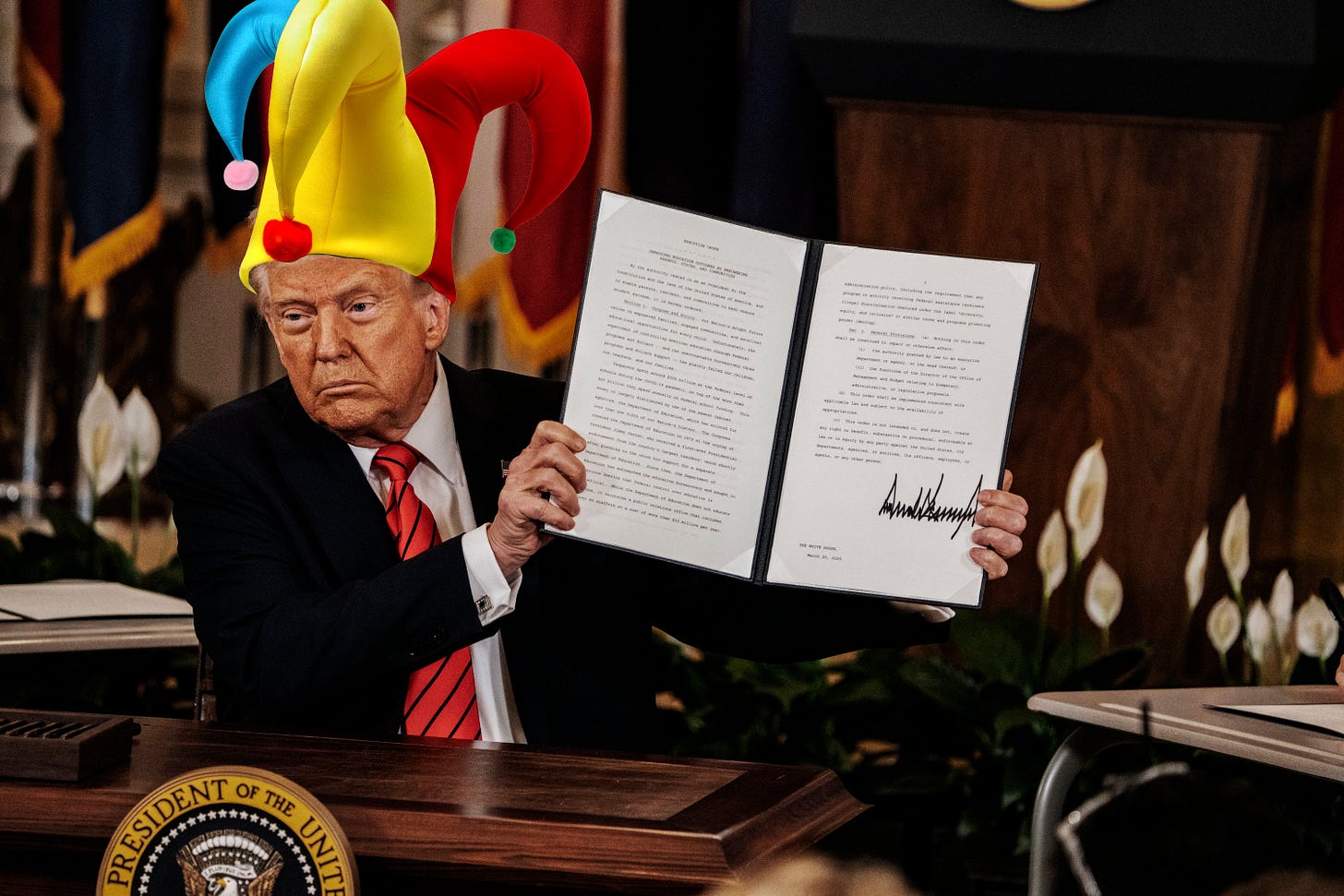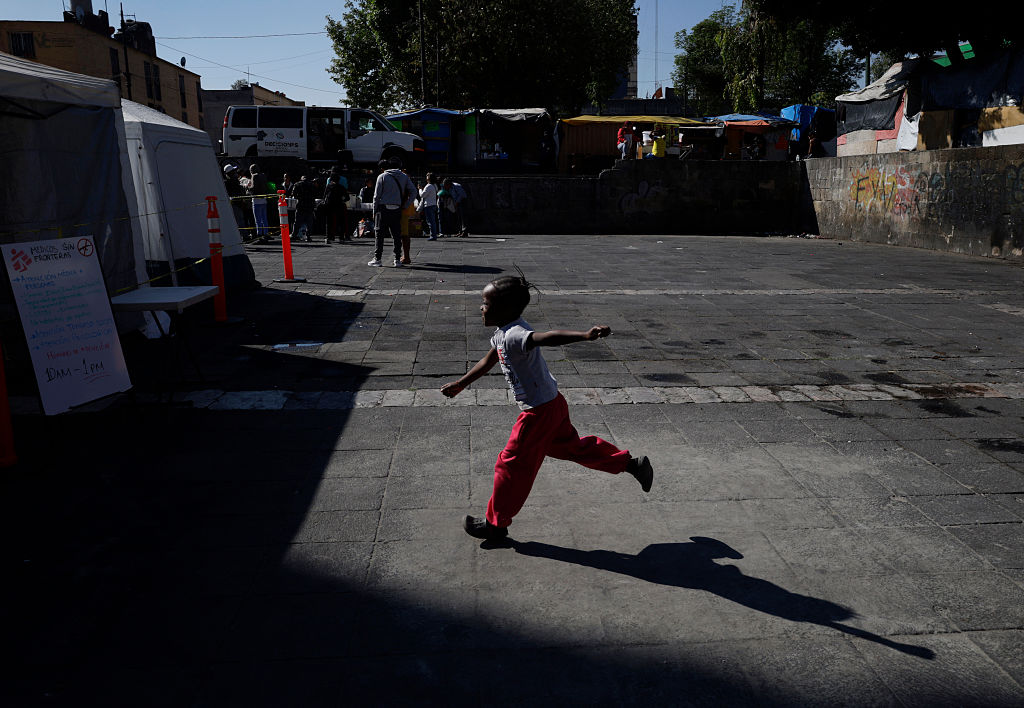
The Crises of Due Process
April 23, 2025
It’s the Stupid, Stupid
April 23, 2025A recent report sounds the alarm about the separation of children from their parents.
This article appears in the Spring 2025 issue of Ms. Join the Ms. community today and you’ll get issues delivered straight to your mailbox.
During President Donald Trump’s first term in office, a particular hell befell nearly 4,000 children who were separated from their families while trying to enter the U.S. at the southern border, according to a January 2019 report by the Department of Health and Human Services Office of the Inspector General.
After crossing into the country, their parents could be charged with “improper entry” and separated from them to face trial. The U.S. Marshals Service would take the adults to a federal courthouse, while the children were sent to the U.S. Office of Refugee Resettlement, which placed them in shelters across the country. The parents, often convicted and sentenced to time served, would return to the agency that first detained them, U.S. Customs and Border Protection—only to find that their children were no longer in CBP custody and sometimes were nowhere to be found.
Efrén C. Olivares, director of strategic litigation and advocacy at the Southern Poverty Law Center, told Ms. there were even extreme cases in which parents were seen by a judge and able to return the same day to the center where their child was first held, but border agents “still kept parent and child apart.”
Olivares added, “There was absolutely no justification for this practice, other than, you know, the cruelty was the point.”
At least 1,360 of these children still had not been reunited with their parents as of March 2024, according to a report from the Family Reunification Task Force.
And now Trump is back in office, ordering increased deportations and authorizing officials to “repel, repatriate or remove” anyone deemed to be “engaged in the invasion across the southern border of the U.S.”—while also suspending the United States Refugee Admissions Program and significantly restricting asylum access in the U.S.
Trump told NBC News in December that this approach could mean deporting families with mixed legal statuses, including family members who have citizenship. “The only way you don’t break up the family is you keep them together, and you have to send them all back,” he said.
There was absolutely no justification for this practice, other than, you know, the cruelty was the point.
Efrén C. Olivares, Southern Poverty Law Center
While the separation of children from migrant families at the U.S. border has drawn significant attention, child-family separation is a global issue. Across the world, from Lebanon to Denmark, conflict, migration, drug abuse, poverty, violence in the home, or humanitarian and climate crises are fracturing families, according to a recent report from SOS Children’s Villages, which provides care for affected families.
No matter a country’s socioeconomic status, common themes emerge: Family separation is driven or enabled by problems at the societal level and inherently weak systems of social protection.
“The separation violates every child’s right to be cared for in a family environment,” the report’s authors wrote. “It carries detrimental long-term consequences on the child’s development and well-being,” whether that means future alcohol and drug abuse or an increased likelihood of teen pregnancy.
According to UNICEF, major humanitarian emergencies multiply the chance of family separation. The organization estimates that during an August 2017 refugee influx from Myanmar to Bangladesh, more than 1,000 children arrived without their families. Since 2017, Save the Children has reunited 7,000 children in South Sudan with their family members. The group estimates that 20,000 children were registered either missing, unaccompanied or separated in the country’s extended conflict with Sudan.
Jill Nosach, CEO and national director of SOS Children’s Villages USA, told Ms. one heartbreaking example of a young Palestinian girl separated from her family by the war in Gaza.
“She’s ready to go home from the hospital but she doesn’t have any idea where her home is,” Nosach said.
Angela Rosales, acting CEO of SOS Children’s Villages International, described another situation, this time in South America: A Venezuelan family—a mother and her three children, ages 3, 7 and 12—were fleeing the country’s instability by heading south. The mother became ill during the trek and died. The children were placed in alternative care services. No one could locate their father, who’d set out on the journey ahead of them. The children had no identification documents, preventing them from being adopted or accessing education, healthcare and other services.
According to Rosales, many children lose their culture and language in the resettlement process. International organizations have documented thousands of Ukrainian children being taken to Russia from occupied territories. These children are often placed in Russian families, sometimes despite having living parents back home. The idea is to erase their Ukrainian language and culture and “Russify” them, Rosales explained.
Under the Convention on the Rights of the Child—the most ratified human rights treaty in history, according to UNICEF—children are not just offshoots of families. They hold rights themselves.
Still, their rights “are not guaranteed,” Rosales said. Children on the move risk not having citizenship anywhere. They can’t access the citizenship of their host country, “but they can also not go back. So where are they from? What is the future for them, and how can we normalize their situation?”
The Palestinian girl that Nosach described who had been separated from her family was so traumatized she wouldn’t speak or eat. When dealing with children with severe trauma, Nosach said, “really it’s making sure that basic needs are met. Are they getting nutrition? Or is there an informal education system that they can be part of?
“Because whether you’re here in the U.S. or some other country, if you’re undocumented or you don’t have a birth certificate, you’re not getting services,” she continued. “What’s best for the child is growing up in a family where you’ve got a trusted parental figure.”
They can’t access the citizenship of their host country, ‘but they can also not go back. So where are they from? What is the future for them, and how can we normalize their situation?’
Angela Rosales, SOS Children’s Villages International
Recent U.S. immigration policy decisions have drawn criticism for the psychological harm they pose to children, whether they’re attempting to migrate alone or facing family separation at the southern border. Olivares said he expects Trump to throw out any protective measures created by former President Joe Biden.
Meanwhile, Republicans in Congress have introduced legislation aimed at expanding criminal penalties for undocumented immigrants “that may make it easier for Trump to separate families,” Olivares said.
When a first illegal crossing is considered a misdemeanor but the second is a felony, this results in a legal framework that can be used to justify separation—by taking a child away from a “felon.” “It sounds like they committed some heinous crime,” Olivares said, “but all they did was cross the border twice.”
On Jan. 20, just hours after taking office, Trump revoked the “sensitive locations” memo. Released in 2011 by the then-director of U.S. Immigration and Customs Enforcement, this memo was meant to ensure that ICE agents did not apprehend parents or children at places like schools and churches. Now the door is open for the government to arrest migrants just about anywhere.
“I wouldn’t be surprised if a mother files for a protective order due to domestic violence, but she is undocumented and then ICE picks her up at the courthouse,” Olivares said.
Safe havens for children at places such as the U.S.-Mexico border or in conflict zones like Gaza are shrinking due to political changes and ongoing instability, even as humanitarian emergencies increase.
Rosales reflects on the harsh reality many children are facing, both at home and abroad: “The world today is not a happy place for children.”
Great Job Lauren Wolfe & the Team @ Ms. Magazine Source link for sharing this story.





